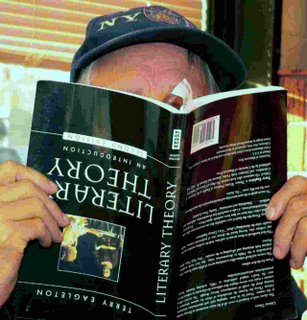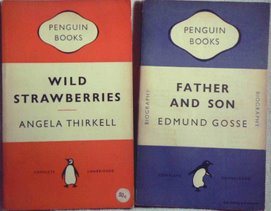Bookninja - In The Magazine
Dept: HardVersuSoft Kathryn Kuitenbrouwer is the author of the newly released novel The Nettle Spinner and the widely hailed shory story collection Way Up. She is also now an editor here at Bookninja.com
“bookninja” got down 'n' dirty about hard versus softcover books.
bookninja's Kuitenbrouwer 'did' the essay on paperback versus hardcover a year-and-a-half ago. The joy of finding her take on the topic online today makes up for missing this message that April day in 2005.
-- Blogolaire (of Cheap Priceless Editions)
Hardcover Logo: Confessions of a TPO
by Kathryn Kuitenbrouwer
Your new book is coming out. You're excited and pleased with the work you've put in. Do you want it to appear in hardcover or trade paper original?
I propose that a brand new hardcover purchase has a seriousness to it. That its high price and strong architecture signal an earnestness, a solid worth, an implicit value that the consumer absolutely cannot do without, right now, and also that the book's author is necessarily substantial.
Globe & Mail Books Editor Martin Levin: the perception is that any author worth his/her salt will be published in hardback.
Westwood Creative Artists Literary Agent Hilary McMahon wonders: if there's a subconscious reinforcement that a book is less weighty, less of a 'big book' by the very fact that it's being published in paperback.
Insomniac Editor, Poet and Bookseller Paul Vermeersh: If we go on the assumption that it is primarily larger publishing houses that routinely publish HCs, and that these publishers have more money to spend on advertising than smaller publishers who routinely publish TPOs, then does it not make sense, albeit somewhat cynical, that the publishers of newspapers who routinely review books would be induced to give more coverage to front list HCs in the hopes of inducing the publishers of said books to spend their advertising dollars on ad space in said newspapers? Just asking, but as the old saying goes, money talks and….
. . .
I couldn't afford to feed my book habit at new stores so I was on the 'righteous' budget. At the antiquarian and used stores, I could get my whole course curriculum for under fifty bucks and still have a little left over for that leather softbound Kipling because it included "Beyond the Pale" which I knew was the absolute key to understanding Eliot's "Prufrock" – or was that "The Wasteland"? Oh, and the Italian/English quarter bound bit of early erotica/smut by Cornazano entitled Proverbs in Jest (published, 1888). You see, I was buying in fits of passion, with the incredulity of epiphany – that joy received through finding uncanny connections in the universe. What little I knew was coming together in unforeseen ways and I found this exciting. I found a Marie Stopes on early birth control. Hey, I had read about her in Germaine Greer! Hey, she was a pioneer of eugenics! The book was like a hot coal in my hand as I considered how many women had been sterilized on account of her theories. Creepy. I must own it. I found a first edition Everybody's Autobiography by Gertrude Stein. I found Venus On the Half Shell by Kilgore Trout. I found everything I could by Richard Brautigan. Did it matter what was hardcover and what was paperback? Absolutely not. The used-book stores that I browsed and in which I eventually worked, aided and abetted my book consumption. Far from undermining sales, these stores are an important link in the literary food chain. They circulate out-of-print books and service those who may in the future be able to afford 'new' books. How do the used booksellers feel about the hard/soft dichotomy?



No comments:
Post a Comment